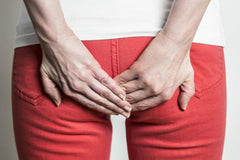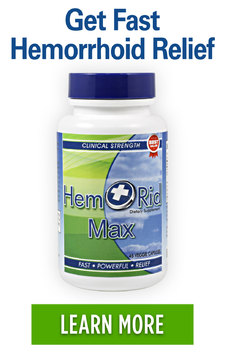Hemorrhoid Flare-Up – How to Stop Hemorrhoid Flare-ups
Posted on 03 November 2018 by Maryanne Johnson
Share this post
If you experience hemorrhoids, there is always a possibility that they will come back, especially if you do not change your habits to prevent them.
Hemorrhoids are the response from your body when there is an impedance to the necessary supply of blood to the lower rectal area.
Many things can restrict this blood flow, the most common are:
- Being overweight
- Pregnancy and childbirth
- Frequent lifting of heavy objects
- Straining while going to the bathroom
- Other poor toilet habits
- Sitting and standing for long periods
If you stop to consider the factors that cause hemorrhoids to become inflamed and produce symptoms of anal itch, discharge, painful masses around the anus, and discomfort, then you come to realize that these instances allow weight on the lower rectal portion of the body.
The second hemorrhoid symptoms begin to rear their ugly head you are likely searching how long these flare-ups last and what you can do to ease the pain, itching, and burning sensation.
Taking a moment to ask yourself what elements could be restricting your rectal blood flow can help you determine how to beat flare-ups for good. Even small lifestyle changes can be of aid in hemorrhoid prevention.
In this comprehensive guide, we’ll go over what you need to know about hemorrhoid flare-ups.
What Causes Hemorrhoids to Flare Up?
Hemorrhoids exist all of the time, but when they become inflamed and irritated, a flare-up occurs.
These flare-ups give way to frequently complained about symptoms:
- Anal itching
- Rectal bleeding and burning
- Sore, painful protrusions
- A discharge of stool matter or mucous
- Discomfort and pain
You already know a few root causes that can restrict the blood flow and result in hemorrhoids, like obesity, pregnancy, and lifting heavy objects, but we can still get deeper into what causes the flare-ups.
Here are a few conditions that can lead to hemorrhoid flare-ups:
- Constipation (straining during a bowel movement)
- Spending too long on the toilet
- Not eating enough fiber
- Taking medications that have side effects like constipation or diarrhea
- A sedentary lifestyle
- Dehydration and not getting enough fluids
- Chronic diarrhea
These are common lifestyle and dietary factors that instigate a hemorrhoid flare-up. Many of them are interconnected—like constipation and the lack of fiber in the diet.
You cannot address just one factor if many apply to your situation, but this doesn’t mean making a complete switch in your lifestyle or diet, your hemorrhoids will respond well to small changes and steps you take to eating and living healthier.
Can Stress Cause Hemorrhoids to Flare Up?
We underestimate what stress can do to our bodies, and the impact stress can have on hemorrhoids is significant enough to account for.
When talking about stress and hemorrhoids, scientific studies tend to discuss physical stress—like how pregnancy delivers extra weight that can stress the rectal veins, causing hemorrhoids, or how straining places pressure and stress on the lower rectum with the same results.
But what about emotional stress? Psychological stress should not be disregarded just yet. In a 2014 article published by the World Journal of Gastroenterology, the authors cite clinical and experimental evidence to link an irritable bowel with an irritable brain in reference to Irritable Bowel Syndrome (IBS).
Now, if our brains under stress can cause IBS symptoms to flare, then it would not be a misfire to hypothesize that psychological stress can adversely impact a hemorrhoidal condition.
We also know that stress and constipation are inherently connected. A 2011 study found that patients suffering from psychiatric disorders also struggled with chronic constipation and other functional gastrointestinal disorders.
With constipation being one of the leading causes of hemorrhoid flare-ups, and stress, anxiety, and depression having a strong correlation to the bowel, there’s a solid argument for “irritable brain, irritable hemorrhoids” hypothesis.
How Long do Hemorrhoid Flare-Ups Last?
Lucky for you, your hemorrhoid flare-up won't last long, but it may seem like a long time depending on the severity of the symptoms. Sometimes, that anal itch can seem like a rude interruption to most of your day, and the burning, aching feeling putting an end to all known, comfortable positions.
Hemorrhoid symptoms and hemorrhoids themselves hang around for just a few days—a week at most. Even if you do not treat your hemorrhoids, they should disappear within this time frame.
You can control your symptoms with:
- Topical creams and ointments
- A warm sitz bath
- Stool softeners, laxatives, or hemorrhoid supplements
- Using a hemorrhoid cushion for sitting
- Suppositories
- Medicated wipes
Can Diarrhea Cause Hemorrhoids to Flare Up?
Yes, as we have covered before, anything other than normal stools can cause hemorrhoids to become inflamed.
You might be able to skate by with just a bout of diarrhea, but if you are experiencing diarrhea chronically, then you will likely see a hemorrhoid flare-up soon after.
Frequent diarrhea leads to equally frequent wiping, sitting on the toilet, and stress on your lower rectum, all of which can easily cause a hemorrhoid flare-up. When hemorrhoids are concerned, these are all considered to be poor toilet habits.
And if you don't have food poisoning or some stomach bug, you will want to ask your doctor what could be causing your irritable bowel. By finding the source of your diarrhea, you are a step closer to a regular bowel and an end to your hemorrhoid flare-up.
Why Do Internal Hemorrhoids Flare Up?
Internal hemorrhoids are the sneakier of the two types of hemorrhoids—you might not even notice they are there until you spot the sign of rectal bleeding. Rectal bleeding occurs after a bowel movement, and you will spot bright red blood coating stools, or when you wipe.
Internal hemorrhoids become aggravated and inflamed for the same reason any hemorrhoid does, and that is because there is a restriction of blood flow or pressure to the rectal veins, arteries, and tissues.
A common instance that can inflame your internal hemorrhoids and cause rectal bleeding is when a hardened stool is lacking in moisture scraps against the interior lining of your rectum, causing an abrasion in the surface, further inciting the swelling.
A productive prevention method for your internal hemorrhoids is to make sure your bowel movements are easy to pass and more comfortable, which can be achieved by eating more fiber.
Hemorrhoids Flare Up During Period
Having your period and hemorrhoids seems like a nightmare all in one. If you experience hemorrhoids during your period, you might be looking for a solution that can help with the combined symptoms.
These remedies can immensely aid in period and hemorrhoid relief:
- Pain relievers
- Tucks medicated wipes
- A warm bath
- Creams and ointments
- Drinking more water
- Light exercise
Menstrual cycles can be the reason for mood swings and irritability, and the condition of your mood can dictate your bowel function, as we mentioned earlier. By taking it easy during your cycle, you can lower the risk of an irritable bowel, and subsequently a hemorrhoid flare-up.
There are many over the counter solutions that can provide relief from period pain and hemorrhoid pain.
External Hemorrhoid Flare-Up
External hemorrhoids can be controlled by the same methods employed for internal hemorrhoids, with the additional ability to use creams and ointments to suppress symptoms.
For some people, using a specially designed hemorrhoid cushion for sitting can help with their external hemorrhoids. Others find relief in lubricating the tender, sore masses around the anus with medication that is pain relieving, numbing, and anti-itch.
An external hemorrhoid flare-up can lead to the possibility of a thrombosed hemorrhoid, a complication to keep your eye out for. A thrombosed hemorrhoid signifies a blood clot, and you can tell if you have one by examining the color of the external hemorrhoid.
Thrombosed hemorrhoids are purple or bluish and will be even more painful. You do not want to lance these hemorrhoids by yourself; instead, you should have your doctor do this to prevent infection.
Your external hemorrhoid flare-up is a sign that something in your diet or lifestyle should be addressed. Doctors often start with the advice of a conservative modification, which can help find the source of what you are lacking.






0 comments